At BSCS, we leverage decades of research on effective science teaching and learning approaches to create high quality professional learning experiences for educators.
Instructional coaching is a key and proven component of our professional learning services. And we now offer instructional coaching services that can be embedded into any district’s or school’s existing professional learning system.
Why Seek Instructional Coaching?
Science educators have so much to consider on a daily basis as they plan for, lead, and reflect on student learning. We can sometimes get into the habit of just-in-time planning. Coaching helps teachers and other educators focus on key features of effective science teaching and learning.
What are the three dimensional learning goals for this lesson? How does this upcoming lesson fit within the larger arc of student learning? How will I create a space that invites and attends to different student ideas? What ideas might I see/hear? How might I respond? How will I know if my approach is effective?
At the end of the day, science educators just want to know they’re making a difference!
BSCS knows the path to effective science teaching and learning is paved with intentional decisions. And our coaches are prepared to support science educators along the way.
We work with incredible educators who are already making the best decisions they can with the information they have available. Through instructional coaching, science educators develop a deeper understanding of their instructional materials, teaching strategies, and connection to their students and classroom context.
And as they explore the relationship between their materials, strategies, and classroom context, they become intentional decision makers. Ultimately, they become more confident and effective educators.
BSCS Instructional Coaching Services
At BSCS, we provide job-embedded professional learning that supports informed decision-making during initial, ongoing, or sustained use of instructional strategies and/or materials. Instructional coaching is an investment in individuals and groups, building capacity as members of a system work towards transforming science teaching and learning.
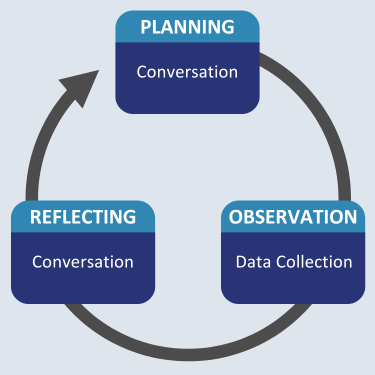
Building from a standard coaching cycle model, we offer customized instructional coaching services in a variety of formats.

BSCS instructional coaching can also take on additional specialized lenses.
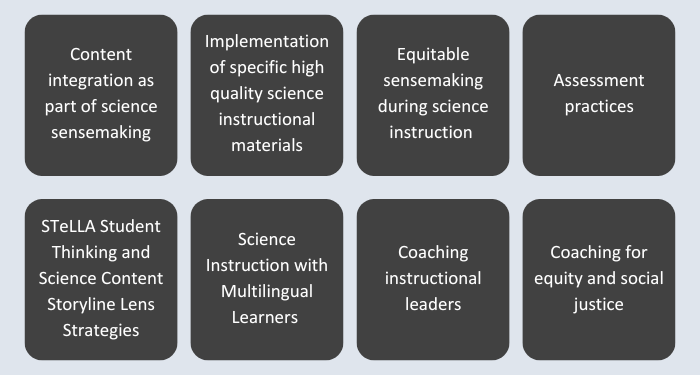
We also offer a coach development program. Contact us to discuss details and identify instructional coaching services that are the right fit for your school or district.
BSCS Science Learning now offers several professional learning programs to support the effective implementation of BSCS Biology: Understanding for Life. For districts that do not have enough high school teachers to justify bringing BSCS Biology professional learning to their site, we offer Registration-based Teacher Institutes with the same content as our District-based Teacher Institutes.
We have virtual Registration-based Teacher Institutes scheduled for winter 2025.
Upcoming Institutes
BSCS invites individuals or small groups from your school or district to attend one of our two-day or one-day, virtual institutes. A minimum of five attendees is required to host these institutes.
Virtual Institute Dates:
- January 27, 2025 – Focused on Unit 3, this one-day institute will deepen understanding of the Unit 3 storyline and the engineering design process, including equitable consideration of multiple perspectives, specifically Indigenous perspectives. The institute will also explore how the BSCS Biology 3D assessment system supports all students in demonstrating and applying their understanding.
- March 10, 2025 – Focused on Unit 4, this one-day institute will deepen understanding of the Unit 4 storyline and the role of the Synthesize, Gap Analysis, and Culminating Task lessons in the AIL instructional model and the development of student agency.
Institute Goals:
- Deepen understanding of three-dimensional, phenomenon/problem-driven teaching and learning as described in the NGSS.
- Deepen understanding of the Anchored Inquiry Learning (AIL) instructional model used in BSCS Biology.
- Increase ability to apply knowledge of equitable teaching and learning in classroom practice to support student construction of a coherent science content storyline.
- Experience Anchored Inquiry Learning lessons and enhance understanding of literacy, emerging multilingual learner (EML), and sensemaking strategies embedded in the curriculum.
- Build community and a common vision for BSCS Biology.
Who Should Participate?
Teachers who:
- plan to pilot and/or adopt BSCS Biology
- work in a small or remote district that cannot justify a professional learning program dedicated to their teachers
School/District leaders who:
- are currently considering piloting and/or adopting BSCS Biology
- wish to support teachers in successfully piloting and/or implementing BSCS Biology
What are the Benefits?
- Discover the impact that BSCS Biology is having on teachers and students across the country–and the impact it can have on teachers and students in your school and district.
- Engage in a powerful professional learning institute designed to maximize your confidence and success in implementing BSCS Biology.
- Join and build community with BSCS Biology users across the country.
What are the Costs?
Two-day Institute:
- Registration for a two-day institute is $500 for the first teacher from a district/school and $400 for each additional teacher.
One-day Institute:
- Registration for a one-day institute is $250 for the first teacher from a district/school and $200 for each additional teacher.
How do I Participate?
Next steps:
- Save your spot by completing this application.
- Guarantee your spot by paying the registration in full.
Full refunds will be issued if BSCS cancels the institute due to low enrollment.
Welcome to BSCS Biology!
Alejandro Lopez says BSCS Biology: Understanding for Life is the best investment his district has ever made in science. As a leader in Compton Unified School District, he’s walked through high school biology classrooms and personally seen a significant change in the way teachers and students are engaging in science. He attributes this change to BSCS Biology’s instructional materials and professional learning (PL) support.
Alejandro isn’t alone. He’s surrounded by a growing community of educators across the country who agree BSCS Biology is exciting and powerful. Experts agree—including the great folks at EdReports who reviewed BSCS Biology and gave it All-Green Ratings, based on the program’s outstanding quality and usability. So get excited. Your district or school has made an amazing decision to adopt BSCS Biology. And you are now part of a community of educators who are going to change the way high school biology students learn and use science throughout their lives!
How to Maximize the Impact of BSCS Biology

Step one is adopting the best program for high school biology programs.

Step two is preparing to implement this program effectively.
We designed this program with teacher support in mind. It is critical to prepare teachers for the exciting journey they’re about to take. We want teachers to feel as confident and effective as possible in their first year of teaching BSCS Biology.
That’s why we highly recommend setting high school teachers up for optimal success with professional learning. BSCS’s robust professional learning program will prepare teachers to smoothly transition to BSCS Biology and maximize their impact in the classroom.
It’s always a challenge to teach a new program for the first time. BSCS Biology is no exception. It’s challenging because it is also a new type of program, designed to give students a sense of agency to engage in, figure out, and apply science in meaningful ways beyond the classroom. This is not a traditional high school biology program. And that means it requires a non-traditional teaching approach.
We’ll explore this approach together in professional learning.
What to Expect from Professional Learning
Our Focus
BSCS Biology professional learning helps teachers develop an understanding of the program’s goals, new Anchored Inquiry Learning instructional model, and resources. As teachers dive deep into the program, their own content and pedagogical knowledge will deepen. And they’ll be ready to completely change what biology teaching and learning looks like in their classrooms.
BSCS is working with districts and schools all over the country in varying capacities to prepare teachers for the effective implementation of BSCS Biology. All of our PL programs achieve the following goals to different degrees:
- Deepen understanding of three-dimensional, phenomenon/problem-driven teaching and learning as described in the NGSS.
- Deepen understanding of the Anchored Inquiry Learning (AIL) instructional model.
- Increase ability to apply knowledge of equitable teaching and learning in classroom practice to support student construction of a coherent science content storyline.
- Experience Anchored Inquiry Learning lessons and enhance understanding of literacy, emerging multilingual learner (EML), and sensemaking strategies embedded in the curriculum.
- Build community and a common vision for BSCS Biology: Understanding for Life.
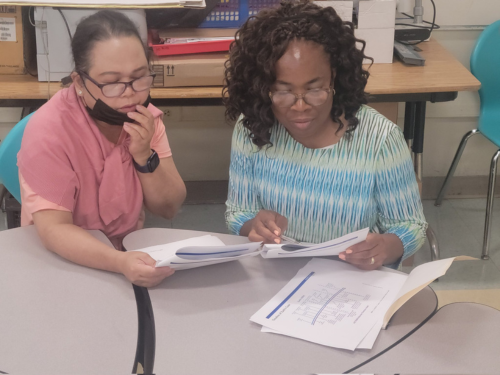
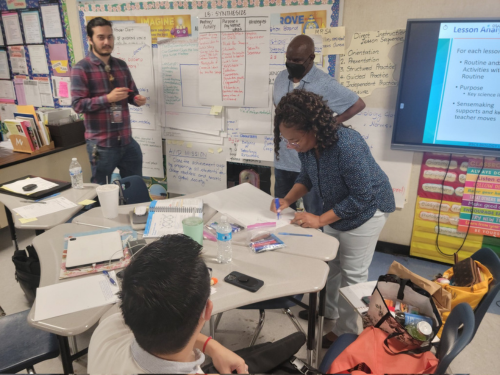
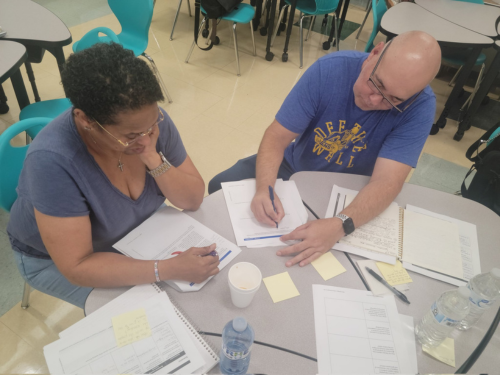
BSCS Biology teacher professional learning in Compton, California.
Pathways for Professional Learning
BSCS offers several pathways for professional learning for teachers and leaders. We offer in-person and online PL formats for 2-day (introductory), 5-day (standard), and 7-day (extended) intensive sessions.
Districts and regional centers can contract BSCS to bring professional learning to a large group of teachers. What’s the right PL pathway, format, and timing for your context? Let’s discuss.
Teachers may also register directly for upcoming institutes. BSCS offers scheduled Teacher Professional Learning Institutes that individual or small groups of teachers can enroll in on a space-available basis. These programs are generally offered in a virtual format, but we will add in-person institutes when there is sufficient demand in a particular region. These opportunities are designed as a support for districts that do not have enough teachers to justify a program dedicated to their teachers.
What will teachers experience during a 2-day, 5-day, or 7-day professional learning institute?
| Time Commitment | Experience | |
|---|---|---|
| Introductory Pathway | 2 days | Focused on Unit 1, the 2-day program supports teachers in understanding the Anchored Inquiry Learning (AIL) instructional model, the role of the Anchor lesson, and the literacy and sensemaking strategies to support student learning. |
| Standard Pathway | 5 days | Building on the 2-day program, the 5-day program adds three days, each day focused on the unit phenomenon or problem and storyline. Teachers deepen their understanding of the AIL instructional model Investigate, Synthesize, and Gap Analysis lessons. The role of formative and summative assessment in student learning is investigated. |
| Extended Pathway | 7 days | The 7-day program builds on the 5-day program with an additional day each for Units 2 and 3. Teachers deepen their understanding of the role of the Culminating Task lesson in developing student agency, consider the role of the program’s assessment system in effective lesson planning and support of equitable student learning. |
Want to learn more? Take a look at what’s included through each PL pathway.
Additional Opportunities for Professional Learning
District/School Leader Professional Learning Programs +
To help school and district leaders in supporting their high school teachers in effective and sustained implementation of BSCS Biology after the conclusion of the Teacher Professional Learning Program, we offer leadership professional learning for school and district leaders. This program will prepare leaders as they lead professional learning communities, coach, and onboard new teachers to support them in planning, teaching, and analyzing student work. This program is offered concurrently with the Teacher Professional Learning Program. In addition to deepening understanding of the Anchored Inquiry Learning instructional model and the program resources, leaders will deepen their understanding of Curriculum-Based Professional Learning, systems of support for effective science teaching and learning, and change management.
Districts interested in conducting a Leader Professional Learning Program should contact BSCS for pricing and logistical information.
Professional Learning Facilitator Institute +
BSCS offers a Facilitator Institute to prepare teacher leaders and others to lead BSCS Biology professional learning for teachers. The goals of the Facilitator Institute include:
- Understand the design of BSCS Biology and of the professional learning program supporting its implementation.
- Increase abilities to make decisions when planning, leading, and reflecting on BSCS Biology professional learning aligned with the program philosophy, goals, and curricula.
- Enhance abilities to establish and grow a community of learners focused on the implementation of BSCS Biology.
- Deepen understanding of the change process and increase abilities to support high school teachers as they implement BSCS Biology.
The program consists of an in-person institute and virtual follow-up sessions. Participants who successfully complete the program are eligible to be certified as BSCS BIology PL facilitators. Certified facilitators gain access to BSCS Science Learning’s proprietary facilitation guides, slides, and additional resources for BSCS Biology professional learning.
What Educators Are Saying
There’s no shortage of inspiring stories about BSCS Biology from the classroom. But some of our favorite stories are about teachers. Because they are the ones showing up to professional learning, and working hard behind the scenes to curate the most meaningful experiences for their students.
STeLLA Online: A Highly Successful Video-based Professional Learning Model in an Online Environment
Calling all Elementary Teachers! BSCS Science Learning is seeking interested upper elementary science teachers for the STeLLA® Online program.
STeLLA Online supports teachers in learning to use effective teaching strategies through a video-based lesson analysis approach.
Upper-elementary science teachers can choose between three STeLLA Online pathways. Each pathway equips teachers with a deep understanding of STeLLA’s highly effective teaching strategies and gives teachers an opportunity to practice analyzing videos to identify their impact on student engagement and learning. All teachers will also have an opportunity to conduct work synchronously and asynchronously within their professional learning communities (PLCs).
BSCS Science Learning offers a free professional learning (PL) opportunity with our Invitations to Inquiry with FieldScope lesson materials, which get students working with real-world data from citizen science projects using FieldScope.
Invitations to Inquiry with FieldScope are 2–4 class period environmental science instructional materials that provide educators and students an initial experience with asking and answering questions by analyzing environmental community and citizen science (CCS) data. They are also designed to support educators and students in sensemaking using scientific data, making progress toward the NGSS practices of analyzing and interpreting data and constructing explanations.
Details
The current opportunity for PL is an online, self-paced course and is free and open to any educators interested in community and citizen science and/or using data in your classrooms or informal settings.
This course will take approximately 3–4 hours to complete. Please sign up so we can keep a record of who completes the course.
FAQs
Which topics do the materials cover?
Check out all 12 Invitations to Inquiry with FieldScope.
What is FieldScope?
FieldScope is BSCS Science Learning’s platform for citizen and community science projects. With FieldScope’s interactive platform, organizers of field studies can leverage sophisticated graphing and mapping visualization tools and resources to enhance their existing and planned citizen science projects.